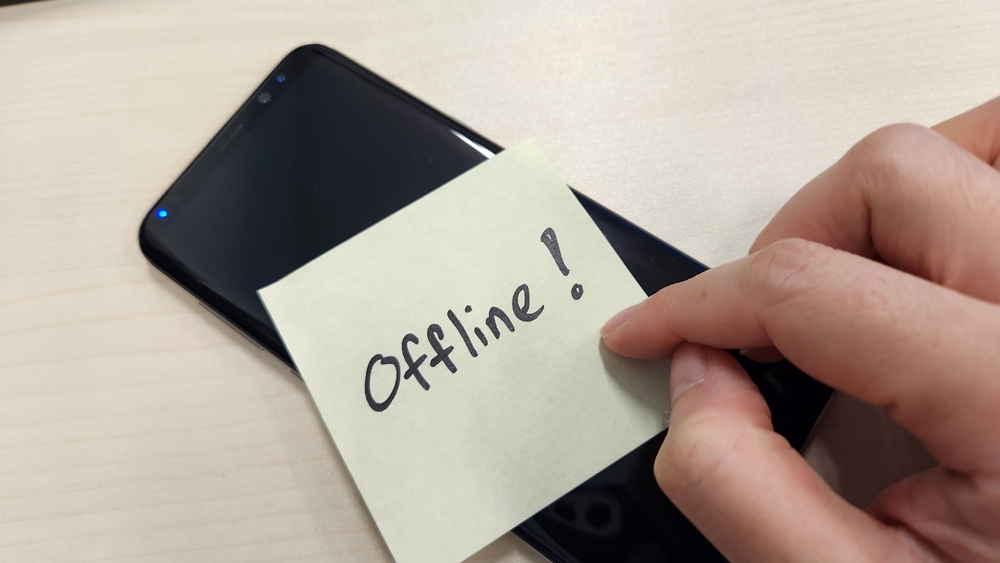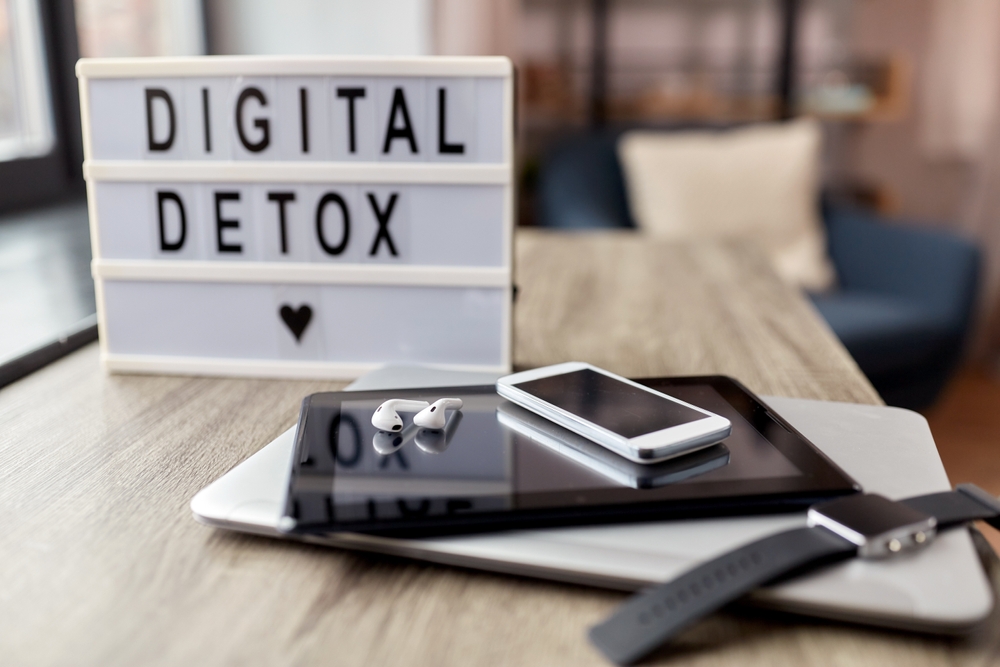In the age of technology we live in, screens and devices surround us at all times. At The Brain Workshop, we don’t believe that this means that we should be overly reliant on them and turn to them compulsively. Not only does too much technology have a negative impact on social interactions—it can severely impact our brains, academics and everyday life when we use it too much, especially for young people and students. One way to get around this issue is digital detox, with a strong emphasis on considering how digital detox improves concentration in students and combats technology and social media addiction.
What Is a Digital Detox for Students?

Digital detox for students can be described as a period of time when you are disconnected from your devices, social media, and other screens. Doing this has the ultimate goal of helping to improve both physical and mental health by stepping away from the online and digital world, and immersing yourself in real life again.
The term ‘digital detox’ is relatively recent, and has come increasingly popular along with the rise of social media and general technology use, and doomscrolling. Now, anyone who wants to disconnect from technology can even book retreats to help them on their journey. For students, this concept is becoming increasingly important, as the overuse of technology is being linked to a decrease in academic performance, worsening social skills, and behavioural challenges.
However, knowing how digital detox improves concentration in students and other areas of their lives, this idea could become even more popular among parents and students—but how does it work, and how do you go on a digital detox?
Does Reducing Screen Time Improve Concentration?
There are many benefits of digital detox, chief among them being improving concentration and the ability to focus when screen time is limited or removed altogether. The link between technology and student performance has been well-documented over the last few years, with excessive technology use being linked to lower academic performance and highlighting the connection between screen time and concentration.
Many of us will already know the struggle of trying to focus on something when the temptation of scrolling on social media is right in front of us. Unfortunately, this can be challenging to overcome, and hard work is required for everyone involved—but it is well worth it when you consider how digital detox improves concentration in students.
How Does Digital Detox Benefit Study Habits?

Study habits are among the first to suffer when students become addicted to social media and technology, which is why digital detox is crucial during key study and exam periods. The impact on study habits digital detox can have has been clear, with this detoxing leading to an improvement in productivity, well-being, sleep, stress reduction, and so much more—which all lead to an improvement in studying and academic performance as a whole.
The science behind how digital detox improves concentration in students is relatively straightforward. With the excessive use of technology and social media, we are constantly distracted and immersed in negative news and a virtual world that gives us a consistent hit of dopamine, leading to us constantly wanting more. When we go on a digital detox for better focus, this addiction is targeted, and allows for more time to be spent on real-life things, whether that is studying or socialising.
Can Digital Detox Boost Academic Performance?
Digital detox can be fantastic for boosting academic performance, as it removes distractions and allows for students to focus on tasks at hand, rather than their phones or other technology. Taking the time to do a digital detox, whether it is some completely, or through daily habits, is also fantastic for boosting mental health and allowing students to focus on the real world around them, allowing them to better communicate, study, and generally thrive.
What Are the Signs a Student Needs a Digital Detox?

Knowing how digital detox improves concentration in students, it is important to be able to identify the signs that a detox is necessary. There are key things to look out for, including increased anxiety and/or depression, difficulty concentrating, worsened academic performance, and more.
Some signs that a student may benefit from a digital detox include:
- Increased symptoms of depression and/or anxiety – mood swings, irritability, anxiety, anger, and frustration when away from their devices, doing too much doomscrolling, or when there is no Wi-Fi
- Difficulty concentrating on tasks – struggling to concentrate on specific tasks, and a shortened attention span on tasks that are not related to their screen use
- General lack of focus – not being able to focus on various tasks and getting distracted easily, particularly by phones and technology
- Insomnia or worsened sleep quality – ‘switching off’ and falling asleep and staying asleep may be difficult, and sleep quality may worsen, all resulting in waking up feeling tired and unrested
- Academic decline/getting worse grades – signs of brain rot, rushing through homework to get back to their screen, grades may drop, and they may participate in fewer extracurricular activities, if any
- Less or loss of interest in hobbies – they do not engage in their previously loved hobbies or interests like they used to, and instead stay on their phones
- Obsessed with their technology – may try to sneak device use, hide devices, or constantly ask for more screen time
- Physical symptoms – such as neck or back pain, dry eyes, or headaches
- Reduced activity – children may be less interested in doing sports, and may participate in ‘bed rotting’ or not want to get out of bed
- Social withdrawal – decreased interest in spending time with friends or being with family, and would prefer to stay on their device
How Long Should a Digital Detox Last for Students?
Everyone has different needs, and digital detox can be done in different ways to suit everyone. A complete digital detox may last anywhere from a few days to a few weeks, while a partial detox can be done every day and turned into a habit, both at home and outside.
Depending on the relationship that a given student has with technology, the length of a digital detox will vary—so, always be sure to personalise a detox to suit individual needs! It’s important to remember that a digital detox does not always need to be extreme, and creating daily habits can go a long way to helping with focus and living more in the here and now.
Below is how long we recommend taking part in a digital detox:
- Partial digital detox – daily, with key boundaries in place
- Full digital detox for most people – one week
- Full digital detox if your tech habits are causing harm – one month
Practical Digital Detox Tips for Better Focus in School And University
If you want to do a digital detox for yourself or someone else, there are several steps you can take and tips to keep in mind to ensure success. From deleting unnecessary apps and setting time limits, to having no-phone zones, there are steps you can take to make the most of daily digital detoxing, or you can cut out technology completely for a full detox.
Bear these tips in mind when digital detoxing:
- Delete unnecessary or distracting apps
- Use an app to set limits on screen or specific app use
- Make plans for alternative activities that don’t involve screens
- Have no-phone areas in the house to encourage digital detox
- Schedule breaks and timers to let you know when to take a breather
- Don’t use your phone during mealtimes or when interacting with others
- Create clear boundaries for yourself to follow regarding phone rules and use
- Downgrade to a phone that doesn’t support apps for the ultimate digital detox
- Put your phone on silent mode at a suitable time (e.g. a few hours before bed)
Can Brain Training and Digital Detox Work Together? The Brain Workshop Can Help

For parents who want to go the extra mile for their children, pairing a daily digital detox with brain training could be especially beneficial for helping with focus, brain function, and so much more. Now that you know how digital detox improves concentration in students, is it something you are considering implementing in your own household?
Ready to help your child improve focus and study habits beyond digital detox? Discover how our brain training programmes at The Brain Workshop can support lasting results. Learn more about us at The Brain Workshop, meet our team, check our events, or even read our FAQ.






